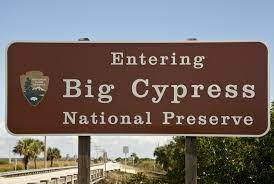Tampa Bay Times Editorial Board
Big Cypress National Preserve is too valuable to allow more oil drilling within its borders. The federal government should acquire the oil and mineral rights that lie underneath the preserve. In the meantime, the U.S. Environmental Protection Agency should use its considerable powers to protect wetlands from oil exploration.
Established in 1974, Big Cypress was one of the nation’s first two national preserves. The 720,000-acre tract lies between Miami and Naples and is essential to the health of the Everglades to its south. Big Cypress is often described as some of the most bio-rich land in the United States.
The preserve is a split property, with the federal government controlling the surface land and private entities owning the underground mineral rights, which include oil and gas.
Many of those underground rights are controlled by the Collier family, which conveyed more than 76,000 acres to the National Park Service in the 1970s, but kept the mineral rights. Many Floridians would be surprised to know that a relatively small amount of oil drilling already takes place in Big Cypress, much to the consternation of environmental groups. In recent years, the Colliers’ lessee, Burnett Oil, has explored opening a new drilling platform in the preserve.
In the 2000s, when George W. Bush was president and his brother, Jeb Bush, was Florida’s governor, the feds and the state attempted to team up to buy the Colliers’ mineral rights in Big Cypress, and nearby Florida Panther National Wildlife Refuge and Ten Thousand Islands National Wildlife Refuge, for $120 million.
Unfortunately, the plan fell apart when news broke that the Interior Department may have overvalued the mineral rights and hadn’t followed department rules. That doesn’t mean the federal and state governments shouldn’t keep trying. Securing the long-term health of such a valuable part of Florida’s ecosystem is a priority.
There is another way to help protect the preserve, even though it wouldn’t permanently resolve the mineral rights issue. Last month, the National Parks Conservation Association sent a letter to the Environmental Protection Agency asking the agency to invoke a rarely used veto under the Clean Water Act.
The association, which advocates on behalf of the national parks system, told the Tampa Bay Times’ Max Chesnes that the situation in Big Cypress was a perfect candidate for the veto because of the preserve’s important relationship with the Everglades. It is also home to several endangered species and is susceptible to damage from the seismic testing that oil companies have used to search for oil.
Plus, there’s a local precedent: The Environmental Protection Agency used this veto in 1988 to protect the Everglades from a rock-plowing project. Even if the federal agency can’t provide a blanket veto on future oil exploration in the preserve, it should seriously consider more narrowly tailored remedies, including denying requests to build additional oil infrastructure.
Preserving one of Florida’s most important parcels of land from future oil exploration and drilling would not only be the right thing to do, it would be popular with most Floridians. It’s time to make this happen.
Editorials are the institutional voice of the Tampa Bay Times. The members of the Editorial Board are Editor of Editorials Graham Brink, Sherri Day, Sebastian Dortch, John Hill, Jim Verhulst and Chairman and CEO Conan Gallaty. Follow @TBTimes_Opinion on Twitter for more opinion news.
“The Invading Sea” is the opinion arm of the Florida Climate Reporting Network, a collaborative of news organizations across the state focusing on the threats posed by the warming climate.



